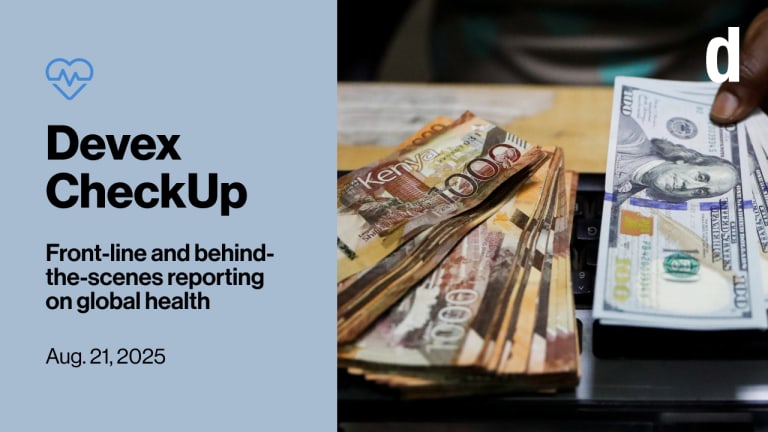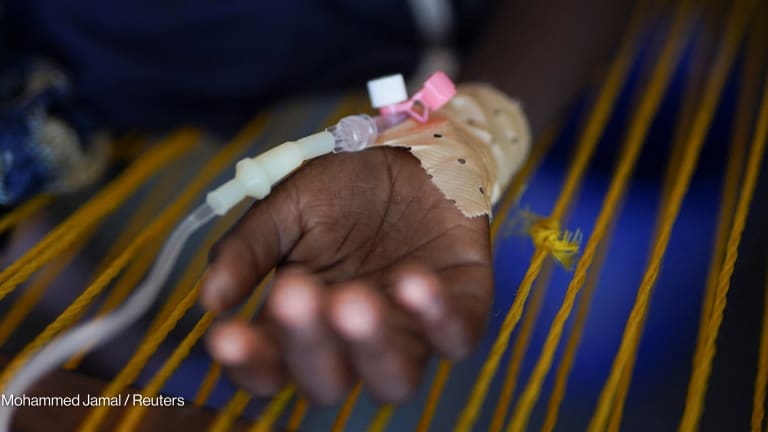
BRUSSELS — The European Union is set to allocate a further €30 million ($33.4 million), and USAID has committed over $38 million in additional funding to the Ebola crisis as donors come under pressure to up their commitments. The World Bank, which has been under scrutiny recently for its Ebola funding disbursements, has also announced $300 million in additional grants and credits for the response.
Monique Pariat, director-general of the humanitarian aid department at the European Commission, told members of the European Parliament that the outbreak will continue “well into 2020,” with 2,500 reported cases and more than 1,700 reported deaths so far. The latest outbreak was declared in the Democratic Republic of the Congo in August 2018, with cases since emerging in the major city of Goma and neighboring Uganda. The World Health Organization declared the outbreak to be a public health emergency of international concern on July 17.
More on Ebola in DRC and the response:
► Q&A: Ebola has reached Goma — what does it mean for the response?
► DRC health minister quits as new president takes over Ebola response
► US Senators search for ways to aid Ebola response in latest hearing
Pariat said the EU was preparing to step up its response to the crisis through its Emergency Aid Reserve, designed to facilitate quick responses to unforeseen events. The parliament’s budget committee recently approved an additional €80 million from the reserve, with €30 million of that intended for the Ebola response and €50 million to address drought in the Horn of Africa.
According to an official document, the increase comes in addition to €40 million already programmed for the Ebola crisis this year and will go to “infection prevention and control, contact tracing, epidemiology and surveillance, water, sanitation and hygiene measures, communication regarding risks, community engagement and social mobilisation, coordination, information management and logistics.”
Meanwhile, USAID’s new funding commitment brings the agency’s total assistance to over $136 million. The funding will cover infection prevention and control and community engagement efforts, surveillance, health care worker training, promotion of safe and dignified burials, and food assistance. The United States is also funding preparedness efforts in neighboring Burundi, Rwanda, South Sudan, and Uganda, according to a news release.
The $300 million from the World Bank will come from the International Development Association — its funding window for lowest-income countries — and the bank’s Crisis Response Window. It will cover Ebola-affected health zones and will include financing for the frontline response and cash-for-work programs. The bank says the amount is “approximately half” of anticipated funding needs in the fourth strategic response plan, which has yet to be finalized. Previously, the bank announced $80 million from its IDA window and $20 million from its Pandemic Emergency Financing Facility.
The United Kingdom announced an extra $63 million for tackling Ebola earlier this month in Geneva, with then-development secretary Rory Stewart saying some donors wrongly thought the response was fully funded. ”The World Bank has been making very positive comments about how they’ve got it all under control. They haven’t,” he said. The current strategic response plan has an overall funding gap of more than $38 million, though some aspects of the response fare better than others.
DRC’s health minister resigned earlier this week, decrying strong pressure to introduce a new experimental vaccine and the decision taken in his absence to manage the response through a multisectoral team reporting directly to the president.
“The coordination structure is being reviewed for the moment, and an updated strategic ebola response plan will be presented very soon,” Pariat said.
Meanwhile, she said, “the number of new infections keep rising”, adding that it is “worrying” that roughly half the cases cannot be traced to already known Ebola cases.
A WHO spokesperson told Devex that in the last week it was possible to immediately trace 74% of cases: 54% because they had been registered as having come into contact with the virus before showing symptoms, and 20% linked to health centers or other settings where they were exposed.
“For the 26% without an immediately apparent source, it can often take a few days to gain access to communities, complete an in-depth investigation to identify the source of infection, and record, consolidate and analyse all the collected data and information,” the spokesperson said. “As such, with time, most cases are eventually tied to a source case, health facility or other source. We, therefore, assess that there are likely few ‘unknown’ chains of transmission within affected communities.”









